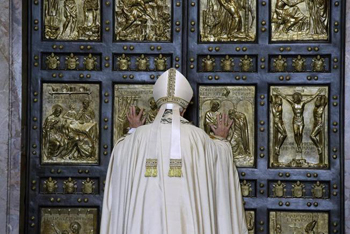This past Tuesday (December 8), Pope Francis declared an "extraordinary" jubilee Year of Mercy.
After a two-hour mass before tens of thousands of worshipers, Francis began the Year of Mercy with a symbolic ritual — knocking on the massive bronze doors of the Basilica of St. Peter, and then walking through them. Whereas the door is usually sealed, this jubilee year the Vatican expects about 10 million pilgrims to walk through that same door.
The symbolic significance? "I am the door," said Jesus in John 10:7. And so Francis prayed, “You are the door through which we come to thee, inexhaustible source of consolation for everyone.”
“To pass through the Holy Door," said Pope Francis in his homily, "means to rediscover the infinite mercy of the father who welcomes everyone and goes out personally to encounter each of them.”
"How much wrong we do to God and his grace when we affirm that sins are punished by his judgment before putting first that they are forgiven by his mercy!"
"It is truly so," said Francis, paraphrasing James 2:13: "We have to put mercy before judgment, and in every case God’s judgment will always be in the light of his mercy."
"Let us abandon all fear and dread, for these do not befit men and women who are loved. Instead, let us live the joy of encounter with the grace that transforms all."
 |
|
Pope Francis opens the Holy Doors.
|
"You cannot conceive of a true Christian who is not merciful, just as you cannot conceive of God without his mercy. Mercy is the key word of the Gospel. . . We should not be afraid: We should allow ourselves to be embraced by the mercy of God, who waits for us and forgives everything.”
We normally think of extending mercy to others. But here's an idea — extend this divine mercy to your own self, for that's what God has already done.
Much of the poetry of Gerard Manley Hopkins (1844–1889) is characterized by darkness and despair, reflecting his lifelong interior struggles. After converting to Catholicism, which estranged him from his Anglican family, Hopkins burned much of the poetry he had written, and even stopped writing for seven years. After ordination as a Jesuit priest, an assignment in Ireland left him feeling isolated and melancholy, thus giving rise to his so-called "terrible sonnets."
But somewhere in his darkness, Hopkins experienced God's light. He moved beyond self-reproach to divine acceptance. In one of my favorite poems, My Own Heart, he describes an interior conversation about accepting "God's smile" upon his life.
My own heart let me more have pity on; let
Me live to my sad self hereafter kind,
Charitable; not live this tormented mind
With this tormented mind tormenting yet.
I cast for comfort I can no more get
By groping round my comfortless, than blind
Eyes in their dark can day or thirst can find
Thirst's all-in-all in all a world of wet.Soul, self; come, poor Jackself, I do advise
You, jaded, let be; call off thoughts awhile
Elsewhere; leave comfort root-room; let joy size
At God knows when to God knows what; whose smile
's not wrung, see you; unforseen times rather — as skies
Betweenpie mountains — lights a lovely mile.
On his death bed with typhoid at the age of forty-four, Hopkins' last words were, "I am so happy. I am so happy. I loved my life." That's the sort of perfection of mercy in an imperfect person for which we should all hope.
A deacon ended the papal liturgy with the words of Jesus: "Be merciful as your Father is merciful."
Image credits: U.S. News & World Report.



